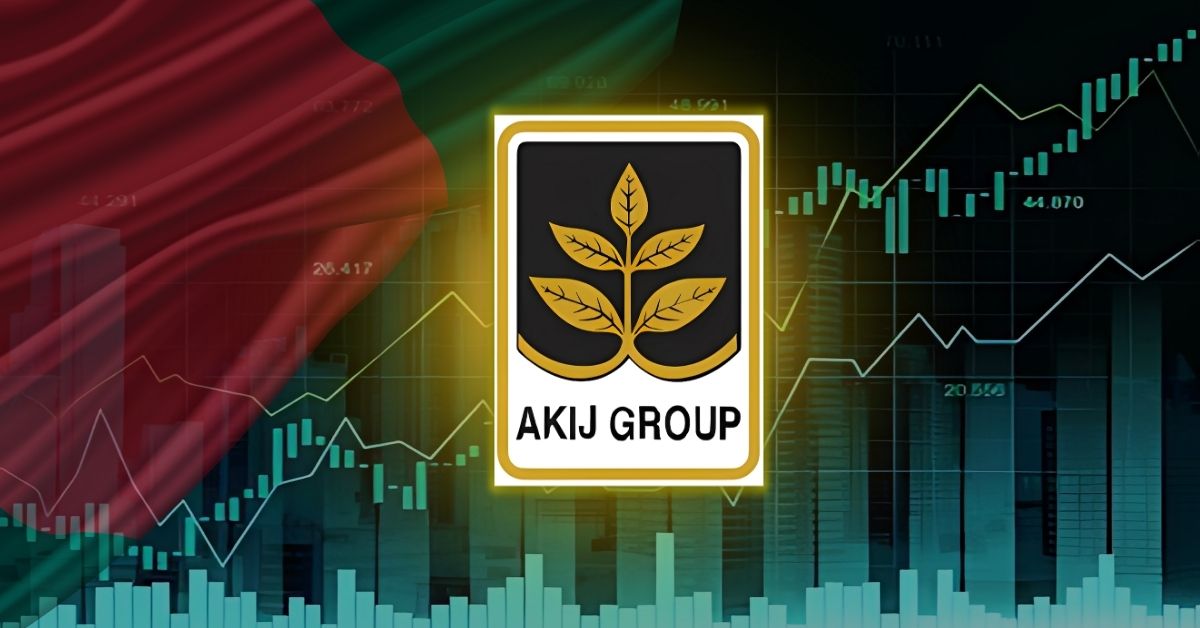Akij Group, which has been in business for almost 75 years, is now one of the largest industrial Business groups in Bangladesh. For a long time, “Akij” has been a well-known name in various sectors including the jute industry, readymade garments, cement, food & beverages, and ceramics. At present, there are 21 different companies under Akij Group including Akij Shipping, Akij Agro-Processing, Akij Steel.
1. Introduction
In the dynamic and rapidly evolving landscape of Bangladesh’s economy, a number of powerful business conglomerates have emerged as key drivers of industrialization, employment, and economic transformation. These conglomerates not only contribute significantly to the nation’s GDP but also shape the socioeconomic fabric of the country by investing in diverse sectors, generating mass employment, and pioneering innovation. Among these industrial giants, Akij Group stands as one of the most prominent and diversified conglomerates, leaving a profound impact on Bangladesh’s business ecosystem.
The group’s sustained success is rooted in its commitment to quality, vertical integration, and investment in human capital. With a workforce of over 50,000 employees, Akij Group is one of the largest private-sector employers in Bangladesh. From its initial ventures in jute and tobacco, Akij expanded into textiles, food and beverages, cement, plastics, ceramics, healthcare, IT, packaging, construction, and real estate—demonstrating a remarkable capacity for adaptation and diversification. Its businesses not only serve the domestic market but also export products to regions such as the Middle East, Southeast Asia, and Africa, strengthening Bangladesh’s position in the global supply chain.
2. History and Evolution
Sheikh Akij Uddin is one of the pioneering names in Bangladesh’s business. Starting his business venture as a local businessman, Akij Uddin soon diverted his business to Jute, Textiles, Leather, Food & Beverages, Particle Board, Cement, and so on. With a diversified business portfolio, Akij Uddin has created a business empire.
2.1 A Village Boy with Big Dreams
Sheikh Akij Uddin was born in 1929 in the village of Madhyadanga in Phultala Upazila of Khulna. He was the only child of Sheikh Mofiz Uddin and Matina Begum. Sheikh Mofiz Uddin was a regional businessman. Although Akij Uddin was admitted to the school when he was a little older, he did not continue his studies for a long time due to his restless nature.
His father was dissatisfied with him about this and got him involved in business due to family difficulties. He started his business by selling chanachur, nuts, and lozenges at Bejerdanga railway station. In between, he also spent some time in his father’s business. However, if there were any mistakes in his father’s business, he would often scold Akij Uddin.

As a result, Sheikh Akij Uddin left home in anger and left for Calcutta. At that time he was only 11 years old and had only 17tk. in his pocket.In the meantime, one day while crossing Ramlochan Street, he saw an orange auction and bought four baskets of oranges from there. Akij Uddin was able to earn 10 paisa by selling them.
Upon learning of Akij Uddin’s hard work and dedication as a fruit seller and loving the frugal Akij’s hardships of life, the owner of Zakaria Hotel arranged for him to stay and eat at his hotel in exchange for 1 anna.Even with all the challenges, he didn’t give up. He saved money and returned to his homeland with one goal in mind—to create something meaningful for his people. This was the beginning of what would later become the Akij Group.
2.2 Starting Small with Big Impact
In 1950, Sheikh Akij used his savings to start a small bidi factory in Navaran, Jessore. Bidis are traditional hand-rolled cigarettes made from tobacco and leaves. The factory wasn’t fancy, but it created jobs for local people and became quite successful. The business grew quickly. People trusted the Akij name because of its honest pricing and quality products. The success of this one small factory gave Sheikh Akij the confidence to invest in other businesses. Instead of keeping all his profits, he reinvested in building new factories and creating more jobs.
2.3 Expanding into New Sectors
Over the years, Akij Group moved into many new industries. The company opened match factories, jute mills, textile plants, and even started making ceramic products. Sheikh Akij had a simple formula: grow slowly, reinvest wisely, and always maintain quality. By the 1980s, Akij Group was already a respected name in the country. The company focused on vertical integration, meaning they made most of their materials themselves instead of importing them. This helped them cut costs, become more efficient, and keep their products affordable for everyday people.
Some of the early successes included:
- Akij Match Factory Ltd.
- Akij Jute Mills Ltd.
- Akij Food & Beverage Ltd.
- Akij Cement Company Ltd.
These ventures created thousands of jobs and helped boost local industries. Akij Group wasn’t just growing; it was helping Bangladesh grow too.
2.4 A New Generation and Modern Vision
After Sheikh Akij Uddin passed away in 2006, his sons took over the leadership. Among them, Sheikh Bashir Uddin became a key figure. The new generation respected their father’s values but also brought in fresh ideas. They introduced modern technologies, digital systems, and professional management styles.
This new approach helped Akij Group become more competitive, not just in Bangladesh, but also in international markets. The company now exports products and has business ties with many countries.Today, Akij Group is a modern, well-managed conglomerate with over 35,000 employees. It operates in sectors like:
- Food and Beverages
- Tobacco
- Textiles
- Cement
- Ceramics
- Real Estate
- Plastics
- IT and Media
Now, Akij Group is one of the biggest companies in Bangladesh, with more than 35,000 workers and businesses in over 15 sectors. From selling oranges on the streets to running a national business empire, Akij’s story is one of hard work, honesty, and never giving up.
3. Business Diversification and Industrial Reach
One of Akij Group’s core strengths lies in its extensive business diversification. From consumer goods to construction materials and digital innovation, the group operates more than 20 major companies across various sectors. This wide portfolio not only showcases the group’s adaptability but also its capacity to withstand market fluctuations—making it one of the most integrated and resilient conglomerates in Bangladesh.
3.1 Tobacco Industry: The Beginning of Growth
The tobacco sector was Akij Group’s original economic engine. Akij Bidi Factory was the company’s first big step toward national recognition. As demand grew, Akij expanded into a more structured tobacco enterprise—Akij Tobacco Company Ltd. This company introduced popular brands like Navy, Red & White, and Sheikh, which became household names across Bangladesh.
Despite growing health concerns around tobacco, the financial contribution from this sector was massive. In 2018, Akij made headlines by selling a majority share of Akij Tobacco to Japan Tobacco International (JTI) for $1.5 billion. This move marked one of the largest foreign direct investments (FDI) in Bangladesh’s private sector history. The sale enabled Akij to redirect capital into other promising sectors such as food, real estate, and technology—making it a turning point for the group’s modernization.
3.2 Textiles and Garments: Weaving Industrial Strength
Bangladesh’s ready-made garments (RMG) sector is one of the world’s largest, and Akij Group has taken full advantage of this national strength. Through Akij Textile Mills Ltd., Akij Yarn Mills Ltd., and Akij Garments Ltd., the group produces a complete range of products—from raw yarn to finished garments. These companies cater to both domestic and international clients.
Their integration enables Akij to manage the full textile supply chain in-house, reducing costs and ensuring high quality. The export of garments brings in significant foreign revenue, while domestic sales provide steady demand.Akij’s textile and garment businesses also contribute heavily to employment, especially in rural areas. With thousands of workers, mostly women, these factories are not just economic engines but also social enablers.
3.3 Food & Beverage: Winning Everyday Consumers
Akij Food & Beverage Ltd. (AFBL) is one of the most visible and successful arms of the group. AFBL’s wide product range—including Frutika juice, Mojo Cola, Speed Energy Drink, Clemon lemon soda, Farm Fresh milk, and Mum mineral water—caters to all age groups and income levels. The company is known for strong branding, creative marketing, and nationwide distribution. It has rapidly gained market share in both urban and rural areas, competing directly with multinational giants like Coca-Cola, PepsiCo, and Nestlé.
AFBL has also invested in state-of-the-art factories, enabling high-volume production with strict quality controls. It exports some of its beverages to Middle Eastern and South Asian countries, contributing to Bangladesh’s global trade footprint. The success of AFBL demonstrates how Akij Group effectively blends consumer insight with industrial scale—creating affordable, desirable products that drive repeat purchases.
3.4 Cement and Construction: Building Bangladesh’s Future
As Bangladesh undergoes rapid urbanization and infrastructural development, Akij Cement Company Ltd. has positioned itself as a key player in this transformation. Its cement is used in major public works, highways, flyovers, and residential projects. What sets Akij Cement apart is its emphasis on research-based product quality, with high-grade clinker, modern production technology, and rigorous quality checks.
The company caters to both institutional buyers and small-scale contractors, creating a large customer base. Additionally, Akij Housing Ltd. contributes to the real estate sector by developing eco-friendly and modern housing solutions, especially in Dhaka and Chattogram. These residential projects reflect Akij’s ambition to become a full-spectrum construction solutions provider.
3.5 Plastics and Packaging: Supporting Industries and Sustainability
Akij Group’s presence in plastics and packaging complements its manufacturing sectors. Akij Poly Fiber Ltd. and Akij Plastics Ltd. produce a wide range of plastic products—from household goods to industrial packaging materials. These companies supply essential packaging solutions for food, pharmaceuticals, and consumer products, supporting both Akij’s own businesses and external clients.
The packaging segment also focuses on sustainable solutions, gradually adopting eco-friendly materials to reduce environmental impact. This is especially important as Bangladesh grapples with plastic pollution challenges. By producing packaging locally, Akij reduces dependency on imported materials, cuts costs, and ensures faster delivery, benefiting Bangladesh’s fast-growing FMCG (fast-moving consumer goods) industry.
3.6 Ceramics: Premium Products for Home and Industry
In the ceramics sector, Akij Ceramics Ltd. has gained recognition for its quality tiles and sanitaryware. These products combine durability, elegant design, and affordability, making them popular for residential, commercial, and public infrastructure projects. Akij Ceramics exports to several countries, including markets in the Middle East and South Asia, enhancing Bangladesh’s industrial export profile.
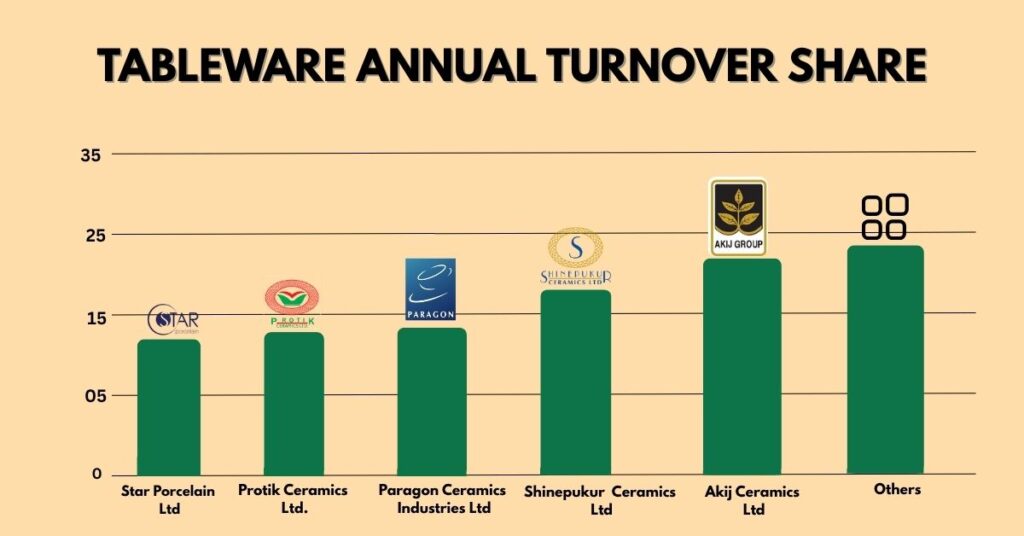
The company invests heavily in modern production technology and design innovation, collaborating with international experts to stay competitive. This focus on quality has earned it awards and certificates, raising the standard of Bangladesh’s ceramic industry.
3.7 Information Technology and E-commerce: Embracing the Digital Future
Recognizing the importance of digital transformation, Akij Group has recently diversified into IT and e-commerce. AkijOnline is a digital platform offering e-commerce, logistics, and business automation solutions, reflecting the group’s ambition to expand into the tech economy. Akij Ventures Ltd. invests in startups and new technologies, focusing on sectors like fintech, logistics, and supply chain management.
By blending traditional manufacturing with digital services, Akij is positioning itself for future growth, capitalizing on Bangladesh’s booming internet penetration and young population.This move toward technology also creates high-skilled jobs and promotes innovation within the group’s overall business strategy.
3.8 Jute and Board Industries: Traditional Roots with Modern Techniques
Akij has maintained a strong connection to Bangladesh’s traditional industries. Through Akij Jute Mills Ltd., the group produces jute products that meet global quality standards. Jute, known as the “golden fiber,” remains an important export item and a source of rural employment. Additionally, Akij Particle Board Mills Ltd. manufactures particleboards and fiberboards for furniture and construction.
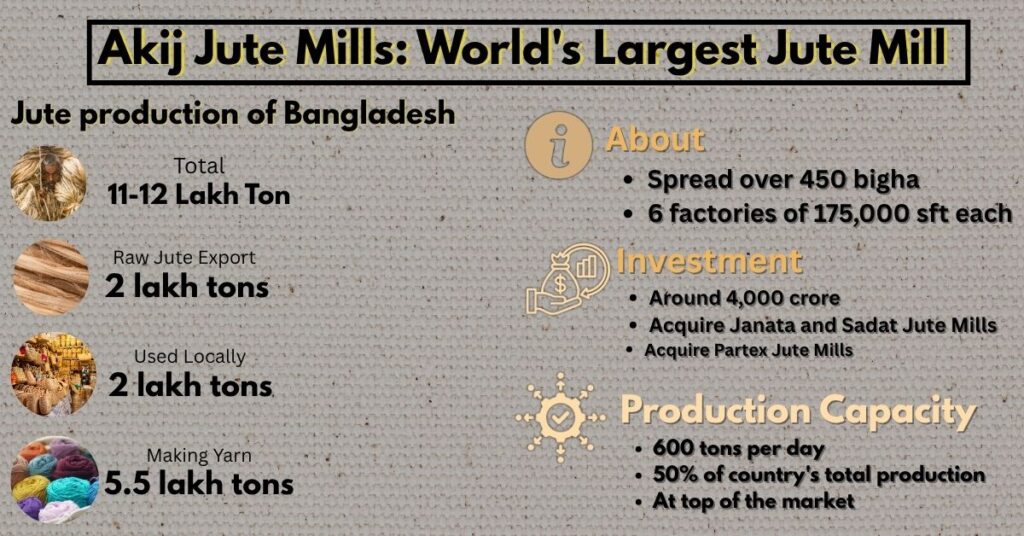
These products are increasingly in demand as Bangladesh’s construction and furniture industries expand. By integrating modern manufacturing techniques with traditional raw materials, Akij supports rural livelihoods while meeting urban demand.
3.9 Social Initiatives: Akij Foundation’s Commitment to Welfare
Beyond its business enterprises, Akij Group is committed to social responsibility through the Akij Foundation. This philanthropic arm runs schools, hospitals, and community programs focusing on education, healthcare, and disaster relief. By investing in healthcare, the foundation improves access to medical services in underserved areas.
Its educational programs offer scholarships, skill training, and infrastructure development, empowering youth and creating a skilled workforce. These social initiatives reflect Akij Group’s understanding that sustainable business growth must include community development. This approach strengthens the group’s brand and contributes positively to Bangladesh’s socio-economic progress.
Other Sectors
- Printing and packaging: Akij Printing & Packaging Ltd.
- Jute: Akij Jute Mills Ltd.
- Board and particleboard: Akij Particle Board Mills Ltd.
- Healthcare and education: Several schools and hospitals run under Akij Foundation.
This wide industrial reach reduces dependency on any one sector and showcases Akij Group’s strategic risk management.
4. Economic Contribution of Akij Group (2020–2025)
From 2020 to 2025, Akij Group has continued to be a powerful force in Bangladesh’s economy, adapting to new challenges and opportunities while expanding its industrial footprint. This period marks a phase of modernization, increased foreign investment, and greater social impact.
4.1. Employment Growth and Workforce Development
Between 2020 and 2025, Akij Group expanded its workforce by over 15%, now employing more than 40,000 people directly. The group has opened new factories and manufacturing units in textiles, ceramics, and packaging sectors, especially in the Jessore and Narayanganj regions, boosting local employment.
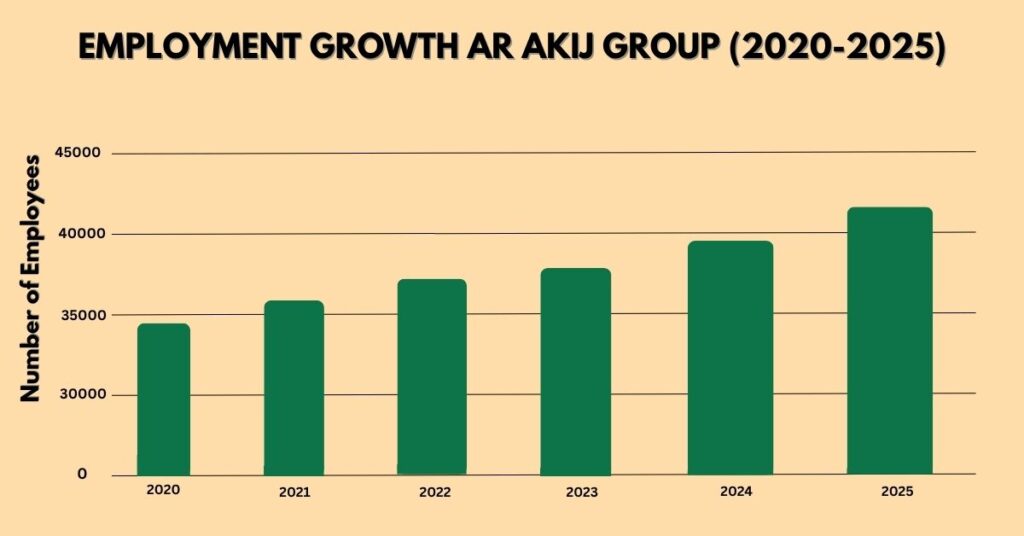
The group’s vocational training centers have increased capacity, training over 5,000 workers annually in technical skills such as machine operation, quality control, and digital management. This has enhanced productivity and helped reduce youth unemployment in industrial hubs.
Example: In 2023, Akij Textile Mills launched a new training program focusing on digital textile printing, benefiting over 1,200 young workers and increasing export readiness.
4.2. Contribution to National GDP and Industrial Output
Akij Group’s various sectors generated an estimated annual revenue of over BDT 8,000 crore (around USD 900 million) between 2020 and 2025, contributing significantly to Bangladesh’s industrial output.
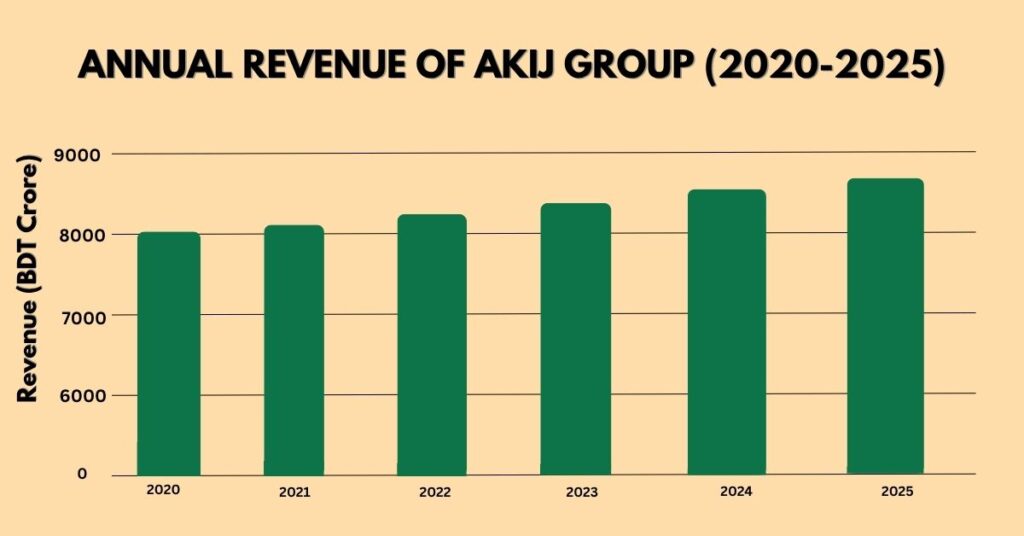
The group increased its cement production capacity by 30%, supporting the booming real estate and infrastructure projects nationwide. Cement sales surged in urban and rural markets, underpinning key developments such as highways, bridges, and housing schemes.
Example: Akij Cement supplied materials for the Padma Bridge Expansion Project in 2024, a major government infrastructure initiative boosting connectivity and trade.
4.3. Foreign Direct Investment and Export Earnings
The landmark 2018 sale of Akij Tobacco to Japan Tobacco International for $1.5 billion continued to generate positive economic ripple effects during this period. The deal catalyzed further foreign investments into Bangladesh’s industrial sectors.
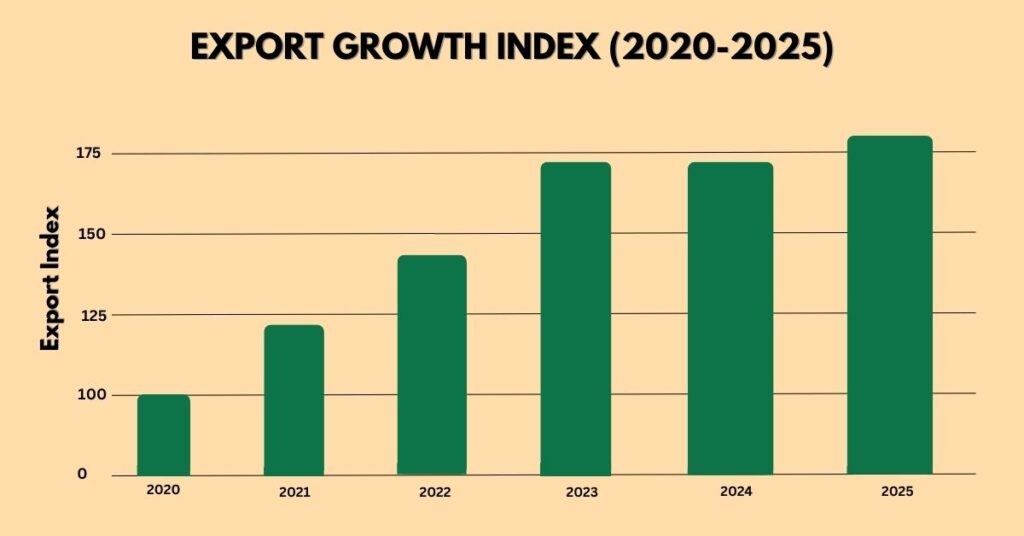
Akij Food & Beverage Ltd. (AFBL) expanded its export markets to Southeast Asia and the Middle East, with exports growing by 20% annually from 2021 to 2024. Popular products like Frutika and Mojo Cola are now available in over 10 countries, contributing to foreign currency inflows.
Example: In 2022, AFBL secured a contract with a major supermarket chain in the UAE, increasing monthly exports by $2 million.
4.4. Strengthening Rural Supply Chains and Growth
Akij Group’s commitment to rural development intensified during this period. The group sourced raw materials from over 10,000 rural farmers and suppliers, particularly in jute, textiles, and agro-products.
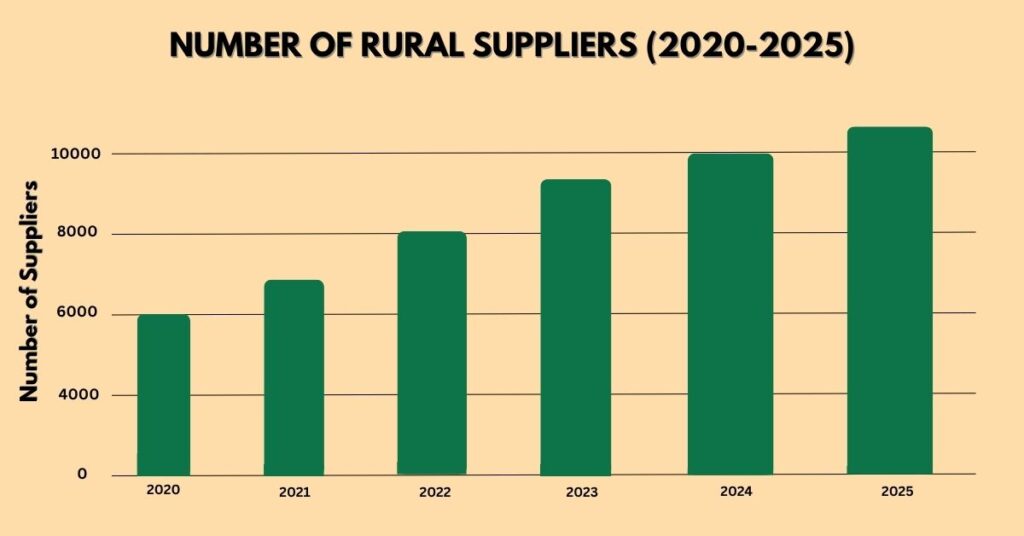
By offering fair prices and long-term contracts, Akij helped stabilize incomes for smallholder farmers, enhancing rural livelihoods. It also invested in cold storage and logistics infrastructure to reduce post-harvest losses.
Example: In 2023, Akij Jute Mills launched a rural supplier development program in Khulna, training 2,000 farmers in sustainable cultivation practices and improving fiber quality.
4.5. Innovation, Digitization, and Sustainability Efforts
Between 2020 and 2025, Akij Group invested heavily in modernizing production lines with automation and digital management systems to increase efficiency and reduce waste.
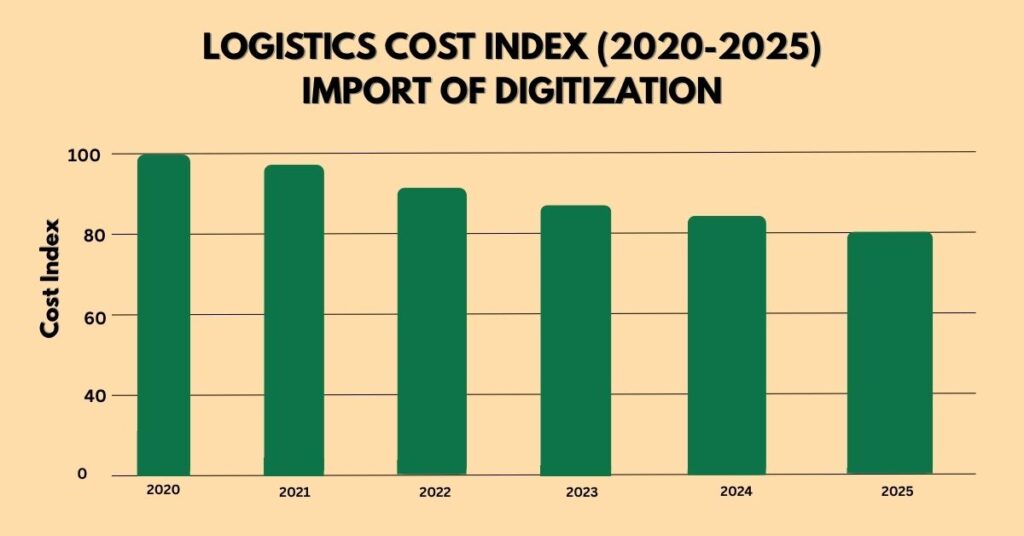
The group also started adopting environmentally friendly practices, including waste recycling at Akij Ceramics and energy-efficient machinery at Akij Textile Mills.
Example: In 2024, Akij Online, the group’s digital venture, launched a logistics platform to streamline product delivery, reducing transportation costs by 15% and improving customer satisfaction.
Challenges Faced by Akij Group (2020–2025)
Despite its strong position, Akij Group encountered several challenges in recent years. However, the group’s strategic management and adaptive approach helped overcome these obstacles effectively.
Market Competition and Changing Consumer Preferences
Problem: The food and beverage sector became highly competitive with new local and international brands entering the market. Consumers increasingly preferred healthier, low-sugar, and organic products, impacting traditional beverage sales like Mojo Cola and Speed Energy Drink.
Solution: Akij Food & Beverage responded by diversifying its product range to include healthier options such as fruit juices with no added sugar and fortified dairy products under the Farm Fresh brand. They invested in market research and launched aggressive marketing campaigns focusing on health benefits, which helped regain market share.
Regulatory Pressure and Compliance
Problem: Increased government regulations on tobacco and environmental standards posed challenges, especially for businesses like Akij Tobacco (before its sale) and Akij Cement. Compliance with stricter emission norms and labor laws required operational changes.
Solution: Akij Group invested in modern technologies to reduce environmental impact, such as installing pollution control equipment in factories and adopting eco-friendly production methods. The group also improved workplace safety standards and compliance training to meet government requirements, maintaining good relations with regulatory authorities.
Supply Chain Disruptions Due to COVID-19 Pandemic
Problem: The global pandemic disrupted supply chains, leading to delays in raw material procurement and logistics bottlenecks. Export-oriented units faced shipment cancellations and increased costs.
Solution: Akij Group enhanced its local sourcing strategy to reduce dependency on imports, supporting rural suppliers to ensure steady raw material availability. The group also digitized its logistics management via AkijOnline, improving supply chain visibility and flexibility. They negotiated flexible contracts with shipping companies and diversified export markets to mitigate risks.
Labor Shortages and Skill Gaps
Problem: Rapid expansion created a shortage of skilled workers, particularly in technical and managerial roles, threatening productivity and quality.
Solution: Akij Group established vocational training centers and partnerships with technical institutes to build a skilled talent pipeline. They launched internal upskilling programs and incentive schemes to retain employees. This focus on human resource development helped maintain high production standards.
Financial Management and Business Modernization
Problem: Transitioning from a traditional family-run model to a professionally managed conglomerate required better financial control, transparency, and governance.
Solution: Under new leadership, Akij Group implemented modern corporate governance practices, including auditing, financial reporting, and risk management. They adopted ERP systems to integrate operations across subsidiaries and improved decision-making with data analytics.
Environmental Sustainability Concerns
Problem: Increasing awareness about environmental impact put pressure on industrial groups to adopt sustainable practices, especially in cement, plastics, and textile production.
Solution: Akij invested in clean technologies, energy-efficient machinery, and waste recycling programs. They began using renewable energy sources in some plants and participated in community environmental initiatives, enhancing their corporate social responsibility image.
Akij Group’s ability to face and solve these challenges shows its resilience and adaptability. Through innovation, investment in technology, workforce development, and sustainable practices, the group not only overcame obstacles but also positioned itself for future growth in a rapidly evolving business environment.
5. Corporate Social Responsibility (CSR) and Sustainability (2024–2025)
In today’s world, the role of business goes beyond profit-making. Akij Group recognizes its responsibility as a major corporate citizen of Bangladesh and commits to contributing positively to society and the environment. Through its dedicated philanthropic arm, the Akij Foundation, the group invests substantially in Corporate Social Responsibility (CSR) and sustainability initiatives, especially focusing on education, healthcare, community welfare, and environmental conservation. These efforts have been particularly impactful during 2024 and 2025, as the group expanded and modernized its CSR approach.
5.1 Education Initiatives: Empowering Future Generations
Akij Group understands that sustainable national development begins with quality education. The Akij Foundation runs several educational institutions designed to increase access to learning, especially in rural and underdeveloped areas such as Jessore and Khulna.
- Akij Collegiate School and Akij Ideal School provide secondary education with modern curricula and extracurricular activities aimed at holistic student development.
- The Akij Polytechnic Institute offers technical and vocational training, equipping students with practical skills aligned with industry demands. This initiative helps reduce youth unemployment by preparing graduates for jobs in sectors like textiles, manufacturing, and IT.
- To ensure inclusivity, the foundation provides scholarships and free educational materials for underprivileged students. This financial support encourages school attendance among children from low-income families and helps reduce dropout rates.
- In 2024–2025, Akij increased its investment in digital learning infrastructure, installing computer labs and internet access to bridge the digital divide in remote areas.
These education initiatives reflect Akij’s commitment to fostering human capital and nurturing a skilled workforce, which ultimately supports Bangladesh’s growing economy.
5.2 Healthcare Contributions: Promoting Community Well-being
Healthcare is another vital area of Akij Group’s CSR focus. The Akij Foundation Hospital in Navaran, Jessore, is a modern facility providing affordable medical services to rural populations who otherwise face challenges accessing quality healthcare.
- The hospital offers specialized care, maternal and child health services, and emergency treatment at subsidized rates.
- Beyond the hospital, Akij organizes medical camps and blood donation drives across the country. These camps provide free check-ups and medicines to underserved communities.
- Akij also conducts awareness programs on critical health topics like maternal nutrition, hygiene, and disease prevention, promoting healthier lifestyles.
- During the COVID-19 pandemic, the group demonstrated exceptional social responsibility by donating essential supplies, including PPE kits, hand sanitizers, and masks to government relief efforts. Akij also re-purposed some of its manufacturing lines to produce sanitizers and masks, addressing urgent shortages.
These healthcare initiatives contribute to improving public health standards and demonstrate the group’s solidarity with the nation during times of crisis.
5.3 Community Welfare Programs: Supporting Social Development
Akij Group’s CSR efforts extend to various community welfare programs designed to uplift disadvantaged populations and support cultural vitality.
- Every year, Akij organizes winter clothing distribution drives for the poor, ensuring vulnerable groups are protected against cold weather.
- The group actively participates in disaster relief operations, providing emergency aid during floods, cyclones, and other natural calamities that frequently affect Bangladesh.
- Women’s empowerment is a key focus area. Akij runs skill-building centers that train women in tailoring, handicrafts, and other marketable skills, helping them achieve economic independence. Many women also find employment opportunities within Akij’s factories, promoting workplace gender diversity.
- The group supports local sports, art, and cultural events, helping preserve Bangladesh’s rich heritage while fostering community spirit.
These social welfare initiatives strengthen the fabric of local communities and align with Akij’s vision of inclusive development.
5.4 Environmental Sustainability: Green Growth and Responsibility
With growing awareness of environmental challenges, Akij Group has taken proactive steps to adopt sustainable manufacturing practices and reduce its ecological footprint.
- Effluent Treatment Plants (ETP) have been installed in textile and chemical manufacturing units to treat wastewater before discharge, minimizing environmental pollution.
- Solar energy has been adopted in selected factories, reducing dependence on fossil fuels and cutting greenhouse gas emissions.
- Akij has committed to sustainable sourcing of raw materials, encouraging suppliers to follow environmentally friendly practices.
- Waste management programs promote recycling in cement and plastics production, reducing landfill burden and conserving resources.
- The group organizes tree plantation campaigns around factories, residential projects, and community areas, contributing to improved air quality and biodiversity.
These environmental initiatives reflect Akij’s dedication to corporate sustainability, balancing industrial growth with ecological stewardship.
5.5 Impact and Recognition
Akij Group’s CSR and sustainability efforts have received recognition from government agencies, industry bodies, and local communities. The group’s consistent contributions have:
- Enhanced access to education and healthcare in remote areas.
- Created livelihood opportunities for marginalized groups, especially women.
- Promoted environmental awareness and adoption of green technologies.
- Strengthened Akij’s reputation as a socially responsible and ethical business leader in Bangladesh.
As the group continues to grow, it remains committed to expanding its CSR programs, ensuring that its business success translates into meaningful social and environmental progress.
6. Innovation and Modernization
One of the key factors behind Akij Group’s remarkable growth and sustained market leadership in Bangladesh is its continuous focus on innovation, technology adoption, and modernization. As global industries rapidly evolve with digital tools and automation, Akij has strategically embraced these changes to enhance efficiency, product quality, customer engagement, and overall competitiveness. From investing in smart manufacturing to launching digital platforms and nurturing a skilled workforce, the group is positioning itself as a forward-thinking conglomerate ready to meet the challenges of the 21st century.
Read more: 2024–2025 Fintech Outlook: Exploring Landscape & Opportunities in Bangladesh
6.1 Technology in Manufacturing: Automating for Efficiency and Quality
Akij Group has heavily invested in modernizing its manufacturing processes across key sectors such as cement, ceramics, textiles, and food & beverage production. These investments involve state-of-the-art machinery, automation, and energy-efficient systems that improve operational productivity while reducing waste and environmental impact.
- Akij Ceramics Ltd. stands out as a pioneer in technological adoption within the Bangladeshi ceramics industry. The company uses Italian SACMI technology for tile manufacturing — a globally respected system known for precision, durability, and aesthetic excellence. This technology ensures Akij’s ceramic products meet international quality standards and remain competitive in export markets.
- In the cement sector, Akij Cement Company Ltd. employs advanced German blending technology. This system enables precise control over raw material mixing and kiln operations, resulting in consistent product quality and improved fuel efficiency. Additionally, it helps reduce emissions and waste, aligning with Akij’s sustainability goals.
- The textile and garment divisions are incorporating automated looms, computerized quality control, and energy-saving machinery to boost output and reduce labor-intensive manual processes. This modernization allows Akij to cater to both domestic and international demands with improved turnaround times and product consistency.
Such technological advancements allow Akij to optimize production costs, maintain product standards, and enhance environmental compliance — crucial factors in sustaining long-term growth.
6.2 Digital Transformation: Expanding Reach and Operational Excellence
In recognition of the rapidly changing digital landscape, Akij Group has aggressively pursued digital transformation across its operations and customer engagement channels.
- In 2023, Akij launched AkijOnline, its own e-commerce platform that offers direct-to-consumer sales of cement, ceramics, beverages, and other consumer products. This platform marks Akij as one of the few large industrial conglomerates in Bangladesh to embrace B2C digital marketing, enabling customers to purchase products conveniently online with reliable home delivery.
- The group has implemented enterprise resource planning (ERP) solutions such as SAP and Oracle ERP across its business units. These platforms streamline critical functions including supply chain management, inventory control, procurement, sales tracking, and financial reporting. By integrating these systems, Akij enhances operational transparency, reduces human error, and accelerates decision-making.
- Akij’s warehouses and logistics centers employ barcode scanning, RFID tracking, and automated inventory systems to improve stock management and minimize delays. These technologies optimize the flow of raw materials and finished goods, ensuring timely delivery and customer satisfaction.
- Internal communication and workflow have benefited from digital tools such as Microsoft Teams, Zoom, and cloud-based project management software, enabling remote collaboration and agile project execution, especially during pandemic-related disruptions.
This comprehensive digital upgrade is helping Akij to remain agile, customer-centric, and efficient amid growing market competition.
6.3 Product Innovation: Meeting Market Demands with Fresh Offerings
Akij Group’s innovation extends deeply into product development, especially within its fast-moving consumer goods (FMCG), ceramics, and textiles divisions.
- The FMCG arm, Akij Food & Beverage Ltd. (AFBL), regularly introduces new flavors, packaging designs, and product variants to attract younger consumers and adapt to evolving tastes. Brands like Speed Energy Drink, Frutika fruit beverages, and Aafi dairy products are continually refreshed with innovative recipes and eye-catching packaging, helping Akij maintain strong brand loyalty and market share.
- Akij’s ceramics division invests in research and development (R&D) to create eco-friendly, durable tiles and sanitaryware. Innovations include water-saving toilet designs and tiles with enhanced scratch resistance, meeting rising consumer expectations and export standards.
- In textiles, Akij focuses on developing sustainable fabrics, incorporating recycled fibers and low-impact dyes. This effort aligns with global sustainability trends and opens new export opportunities.
Such product innovation demonstrates Akij’s responsiveness to consumer preferences and commitment to quality and sustainability.
6.4 Innovation in Marketing: Digital Engagement and Youth Appeal
Akij Group has transformed its marketing strategy by leveraging digital platforms, social media, and influencer partnerships to reach a broad and young audience.
- Akij’s social media campaigns for products like Mojo Cola, Speed Energy Drink, and Frutika have gained wide popularity, using creative storytelling, viral challenges, and celebrity endorsements.
- The group runs interactive digital advertising on platforms such as Facebook, Instagram, YouTube, and TikTok, engaging customers with product launches, contests, and user-generated content.
- Akij has also invested in data analytics to monitor consumer behavior and tailor campaigns more effectively, ensuring maximum return on marketing spend.
By adopting these innovative marketing techniques, Akij has refreshed its brand image and secured its position as a household name among younger consumers.
6.5 Training and Capacity Building: Developing a Future-Ready Workforce
Technology and innovation require a skilled and adaptable workforce. Akij Group invests heavily in training and capacity building to prepare employees for new operational realities.
- The group conducts regular workshops and certification programs on industrial automation, quality assurance, digital literacy, and sustainable production.
- Mid-level managers and factory staff receive hands-on training on modern machinery, ERP systems, and safety protocols.
- Akij partners with vocational institutes and international consultants to deliver cutting-edge industrial training and management development courses.
- Employee feedback programs encourage continuous learning and innovation at all organizational levels.
By fostering a culture of skill development and innovation, Akij ensures its workforce can fully leverage technological advancements and drive ongoing modernization. Akij Group’s focus on innovation and modernization has been pivotal in transforming it from a traditional industrial conglomerate into a dynamic and competitive market leader. By investing in advanced manufacturing technology, embracing digital transformation, fostering product innovation, revolutionizing marketing, and upskilling its workforce, Akij continues to strengthen its position in Bangladesh’s industrial landscape.
7. Global Expansion and International Trade
While Akij Group’s primary market remains Bangladesh, the period from 2020 to 2025 has seen the conglomerate make significant advances in international trade and global outreach. This strategic push into global markets aligns with Akij’s vision to become a truly international Bangladeshi brand, enhance foreign currency earnings, and diversify its business footprint beyond national borders.
7.1 Expanding Export Activities: Diversifying Global Markets
Akij Group exports a wide range of products from its diversified portfolio, contributing to Bangladesh’s growing industrial exports and generating valuable foreign currency inflows. The group has been steadily expanding its export footprint, targeting both traditional and emerging markets.
- Textiles and Apparel: Through Akij Textile Mills Ltd. and Akij Garments Ltd., the group exports quality fabrics, yarns, and ready-made garments to more than 20 countries. Key export destinations include the European Union (EU), the United States, and the Middle East. Akij’s textile products meet international quality and compliance standards, enabling it to tap into competitive and high-value markets.
- Ceramics: Akij Ceramics Ltd. has successfully entered markets such as Australia, India, and several African countries. Its premium tiles and sanitaryware, manufactured using Italian SACMI technology, are favored for their durability, design, and eco-friendly production processes. Expanding distribution channels and participation in global trade fairs have helped Akij grow this segment.
- Food and Beverage: Akij Food & Beverage Ltd. (AFBL) exports beverages like Frutika fruit drinks and other FMCG products primarily to Gulf Cooperation Council (GCC) countries including Saudi Arabia, the UAE, and Kuwait. These products appeal to the large Bangladeshi expatriate population as well as local consumers seeking new flavors.
Akij’s export activities support Bangladesh’s industrial diversification and help reduce the country’s trade deficit by earning foreign currency. Moreover, expanding into international markets strengthens Akij’s brand reputation and competitiveness.
7.2 Major Foreign Direct Investment (FDI) and Strategic Partnerships
One of the landmark events in Akij Group’s recent history was the 2018 sale of its tobacco business to Japan Tobacco International (JTI). This deal, valued at approximately $1.5 billion, was the largest foreign direct investment (FDI) in Bangladesh at that time and had a lasting impact on Akij’s global business strategy.
- This sale enabled Akij to exit a controversial sector that faced increasing regulatory scrutiny and public health concerns, allowing the group to focus on less contentious and more sustainable business segments.
- The capital raised through this transaction empowered Akij to invest in modernization, diversification, and digital transformation across other industries.
- It also improved the group’s corporate image by associating with a multinational company known for global standards.
Beyond this transaction, Akij has been actively seeking strategic alliances and partnerships in areas such as:
- Logistics and supply chain management, aiming to improve export efficiency and overcome infrastructure bottlenecks.
- Software development and digital platforms through Akij Ventures Ltd., targeting the growing demand for IT services both locally and regionally.
- Advanced manufacturing technologies by collaborating with foreign technology providers to enhance product quality and operational efficiency.
These collaborations are essential for Akij to compete internationally and leverage global expertise.
7.3 Challenges in Global Expansion
Despite these achievements, Akij Group faces several significant challenges in its quest for greater international presence:
- Global Quality Standards and Certifications: Different countries have stringent product standards and certification requirements. Achieving and maintaining compliance — such as ISO certifications, CE markings for ceramics, or FDA approvals for food products — requires continuous investment and quality control.
- Shipping and Logistics Constraints: Bangladesh’s port infrastructure and logistical networks face capacity limits and delays. These issues increase lead times and shipping costs, reducing Akij’s competitiveness in fast-paced international markets.
- Intense Regional Competition: Akij competes with well-established manufacturers from India, China, and Southeast Asia, countries with larger industrial bases and cost advantages. Competing effectively requires innovation, pricing strategies, and enhanced marketing efforts.
- Regulatory and Trade Barriers: Tariffs, import quotas, and non-tariff barriers in target markets occasionally restrict access or increase costs.
Despite these hurdles, Akij has adopted a proactive approach — improving product quality, investing in certifications, optimizing supply chains, and focusing on niche markets to sustain growth.
7.4 Branding and International Reputation
Building a global Bangladeshi brand is a priority for Akij Group. The group is investing heavily in upgrading its branding, packaging, and marketing strategies to align with international consumer preferences.
- Packaging designs for ceramics, beverages, and FMCG products are being modernized with a focus on aesthetics, usability, and environmental sustainability.
- Advertising campaigns increasingly use digital platforms and social media channels to reach global audiences, with content tailored to local tastes in export markets.
- Akij participates regularly in international trade fairs and expos, showcasing its products and building relationships with overseas distributors and retailers.
- Efforts to obtain global quality certifications and awards further enhance Akij’s credibility and consumer trust internationally.
Through these initiatives, Akij aims to transform from a primarily domestic industrial player into a recognized global brand, representing Bangladesh’s manufacturing excellence on the world stage.
Looking ahead, Akij Group remains optimistic about its global expansion plans. Key focus areas for 2025 and beyond include:
- Expanding exports in South Asia, Africa, and Southeast Asia, where emerging markets show strong demand for quality textiles, ceramics, and food products.
- Strengthening logistics partnerships and investing in infrastructure to reduce shipping costs and delivery times.
- Deepening technology partnerships to enhance production capabilities and innovation.
- Exploring new sectors such as renewable energy and advanced IT solutions for global markets.
By leveraging its diverse industrial base, financial strength, and growing international experience, Akij Group is well-positioned to capitalize on Bangladesh’s rising prominence in global trade and contribute to the country’s economic development through international business.
8. Future Vision and Strategic Roadmap
Akij Group’s vision for the future is ambitious yet pragmatic. Moving beyond its stronghold in traditional industries, the conglomerate is proactively charting a path of diversification, technological innovation, sustainability, and global expansion. The strategic roadmap laid out by Akij is designed to establish it as a regional industrial leader and a pioneer of ethical, green business practices that resonate with evolving market demands and global standards.
8.1 Diversification of Business Portfolio
Akij Group already ranks among Bangladesh’s most diversified conglomerates, but the future calls for deeper and broader engagement in emerging sectors. The company is actively exploring opportunities that align with global trends and Bangladesh’s developmental priorities:
- Renewable Energy: Recognizing the urgent need to reduce dependence on fossil fuels, Akij is investing in solar and biogas energy projects. These efforts aim to power its factories sustainably and contribute to the national grid. Solar installations are being piloted at select manufacturing sites, while biogas initiatives seek to convert industrial and agricultural waste into clean energy.
- Information and Communication Technology (ICT) & Software Development: The group has declared its intention to build software parks and innovation hubs. Investments in artificial intelligence (AI), the Internet of Things (IoT), and cloud computing will enhance Akij’s manufacturing, logistics, and service sectors. These technologies promise to improve operational efficiency and create new revenue streams in the burgeoning digital economy.
- Agro-Tech and Organic Farming: Through Akij Agro, the company is experimenting with smart farming technologies like drone-based crop surveillance, automated irrigation, and precision agriculture. This move aligns with growing global and local demand for organic, sustainable agriculture that increases yield while conserving resources.
- Healthcare and Pharmaceuticals: Inspired by its CSR-driven healthcare initiatives, Akij is considering entry into the pharmaceutical manufacturing sector. This strategic diversification aims to improve access to affordable medicines and healthcare products within Bangladesh and for export.
8.2 Smart Infrastructure Development
Akij’s real estate division is focused on eco-friendly and smart urban development projects designed for the future of Bangladesh’s cities. The group is developing:
- Smart Housing and Eco-Townships incorporating renewable energy sources such as solar panels.
- Rainwater harvesting systems to conserve water in residential and commercial buildings.
- Smart metering technologies to monitor and optimize electricity and water consumption.
- Use of energy-efficient architecture and sustainable building materials to reduce carbon footprints.
These developments respond to Bangladesh’s rapid urbanization and growing demand for greener, healthier living environments.
8.3 Human Capital and Talent Development
Acknowledging that innovation and growth depend on capable people, Akij is heavily investing in human capital development:
- Building partnerships with local and international universities to foster research and innovation collaborations.
- Offering industry internships and apprenticeships for engineering, business, and IT students to prepare the next generation workforce.
- Establishing dedicated institutions like the Akij Business School and vocational training centers to build specialized skills tailored to the company’s evolving industrial needs.
By cultivating talent in-house, Akij aims to remain agile and competitive in the face of Industry 4.0 challenges, empowering employees to lead digital transformation and sustainable practices.
8.4 Digital and AI Transformation
Akij Group is fully embracing digitalization as a core pillar of its strategic growth. The company has integrated cutting-edge technologies such as:
- Artificial Intelligence (AI) for smart inventory control and predictive maintenance in manufacturing units, reducing downtime and operational costs.
- Data analytics for consumer behavior forecasting in the fast-moving consumer goods (FMCG) sector, enabling targeted marketing and product development.
- Use of blockchain for transparent supply chain management and secure financial transactions.
- AI-driven automation in human resources management and procurement systems to improve decision-making, reduce errors, and increase efficiency.
These digital innovations are positioning Akij as a modern, tech-savvy conglomerate ready to compete globally.
8.5 Sustainability Goals: 2030 and Beyond
Sustainability is no longer optional; it is embedded in Akij’s future strategy. The group has aligned its goals with key United Nations Sustainable Development Goals (SDGs), including:
- Zero Hunger: Supporting food security through agro-tech innovations and responsible supply chains.
- Clean Water and Sanitation: Reducing water waste in factories and real estate projects via efficient systems.
- Responsible Consumption and Production: Increasing use of recyclable packaging materials and waste recycling initiatives in cement, ceramics, and plastics.
- Climate Action: Committing to net-zero carbon emissions by 2040, with incremental reduction targets for 2030 through renewable energy adoption and cleaner manufacturing processes.
Akij’s environmental and social governance (ESG) efforts demonstrate its commitment to ethical business and long-term planetary stewardship. Akij Group’s future vision and strategic roadmap is a testament to its desire not just to grow bigger, but to grow better — balancing industrial expansion with technological innovation, human development, environmental responsibility, and global integration.
By investing strategically in emerging sectors, smart infrastructure, and people, while pursuing ambitious sustainability and internationalization goals, Akij is positioning itself as a regional industrial powerhouse and a model for ethical, green business. This transformation will ensure the group’s relevance, competitiveness, and positive impact well into the mid-21st century and beyond.
9. Conclusion
Akij Group has established itself as one of Bangladesh’s most influential and diversified business conglomerates. Its significant contributions to employment, industrial development, and export earnings have made it a key driver of the country’s economic growth. By creating thousands of jobs and fostering regional industrialization, Akij has helped uplift many local communities.
The group’s strong commitment to Corporate Social Responsibility through education, healthcare, and environmental initiatives reflects its dedication to sustainable development. Akij’s investments in green technologies and renewable energy demonstrate its awareness of global environmental challenges and responsibility toward future generations. Innovation and modernization are at the core of Akij’s competitive edge. Advanced manufacturing technologies, digital transformation, and product innovation have positioned the group as a forward-looking industry leader. Its expanding international trade and strategic partnerships signal a growing global presence.
Looking ahead, Akij’s future vision focuses on diversification into renewable energy, ICT, healthcare, and smart infrastructure, alongside ambitious sustainability goals such as achieving net-zero emissions by 2040. With its balanced approach to economic growth, social welfare, and environmental stewardship, Akij Group is well poised to continue playing a vital role in Bangladesh’s industrial and sustainable development for years to come.
References:

